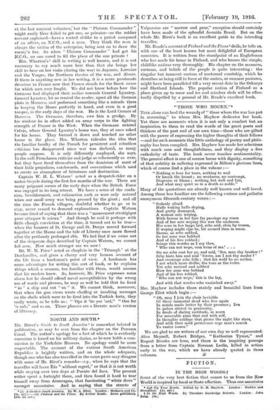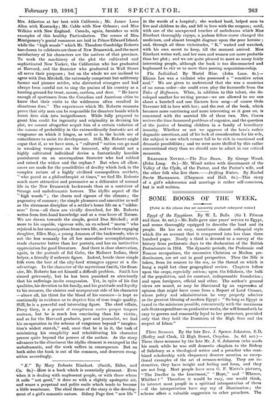FICTION.
IN THE HIGH WOODS.t
SOME of the very best fiction that comes to us from the Now World is inspired by local °ratite affection. Thus one associates • Lilt lip Your Hearts. Edited by D. M. Mayhew. London : Hodder and Stoughton. -11e. net.] In the High Woods. By Theodore Cloodridge Roberts. London : John Long. the Mrs. Atherton at her best with California ; Mr. James Lane Allen with Kentucky; Mr. Cable with New Orleans; and Miss Wilkins with New England. Canada, again, furnishes us with examples of this healthy Particularism. The scenes of Miss Montgomery's genial romances are laid in Prince Edwardlsland, while the "high woods" which Mr. Theodore Goodridge Roberts has chosen to celebrate are those of New Brunswick, and the most satisfactory of his characters are the natives of that province. To work the machinery of the plot the cultivated and sophisticated New Yorker, the Californian who has graduated at Harvard, and the financier who graduated in Wall Street all serve their purposes ; but on the whole we are inclined to agree with Dan Mitchell, the extremely competent but unliterary farmer and pioneer settler, who distrusted strangers and had always been careful not to sing the praises of his country as a hunting-ground for trout, moose, caribou, and deer. " He knew enough of sportsmen from the Canadian and American cities to know that their visits ,to the wilderness often resulted in disastrous fines." The experiences which Mr. Roberts recounts prove that city men can be responsible for disasters beside which forest fires sink into insignificance. While fully prepared to grant him credit for ingenuity and originality in devising his plot, we cannot altogether acquit him of a certain violation of the canons of probability in the extraordinarily fantastic act-of vengeance on which it hinges, as well as in the lavish use of coincidences to assist its development. Still, Mr. Roberts might argue that if, as we have seen, a " cultured " nation can go mad in wreaking vengeance on the innocent, why should not a highly cultivated individual devise a fantastically horrible punishment on an unscrupulous financier who had robbed and ruined the widow and the orphan I But when all allow- ances are made for the possibilities of devilry which lurk in the complex nature of a highly civilized cosmopolitan aesthete, " who posed as a philanthropist at times," we find Mr. Roberts much more attractive and persuasive as a delineator of normal life in the New Brunswick backwoods than as a contriver of strange and melodramatic horrors. The idyllic aspect of the high woods " ; the charm and rigours of the climate ; the pageantry of summer ; the simple pleasures and amenities as well as the strenuous discipline of a settler's home life on a " wilder- ness " farm—all these are vividly described, for Mr. Roberts writes from first-hand, knowledge and as a true lover of Nature. We are drawn towards the simple, genial Dan Mitchell ; still more to his capable, vigorous wife, an ex-school " marm " who rejoiced in. her emancipation fronvtovnt life, and to their engaging daughter, Ellen May, a young Amazon of the backwoods, who is not the less womanly for all her masculine accomplishments, reads character better than her parents, and has an instinctive appreciation for good literature. And there is close observation, again, in the portrait of Sol Gabe, the Maliseet Indian, their helper, a friendly if unheroic figure. Indeed, beside these simple folk even the best of the city-bred strangers appear at a dis- advantage. In the character of the mysterious Smith; the finan- cier, Mr. Roberts has set himself a difficult problem. Smith has sinned grievously, but he has been punished so atrociously that his sufferings invite compassion. Yet, in spite of his fine qualities, his devotion to his family, and his gratitude and loyalty to his rescuers, the sinister and unrepentant side of his character —above all, his thirst for the blood of his enemies—is kept so continually in evidence as to deprive him of true tragic quality. Still; he is a powerful and interesting figure. The chief villain, Percy Grey, is a grande et e,onspieuunt nostro guogue tempore nostrum, but he is much less convincing than his victim ; and as for the Harvard graduate, poet and journalist, we find his co-operation in the scheme of vengeance beyond " imagina- tion's widest stretch," and, once that he is in it, the task of minimising his compliCity and rehabilitating his character proves quite beyond the powers of the author. As the story advances to the denoilment the idyllic element is swamped in the melodramatic, and the work suffers in consequence. But on both aides the book is out of the common, and deserves recog- nition accordingly.



































 Previous page
Previous page